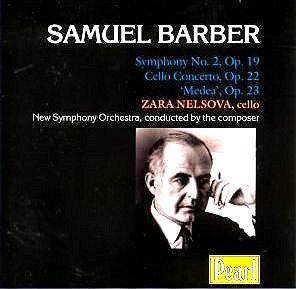This issue will be eagerly acquired by Barber devotees.
Those who have been in this position since the dawn of the LP will already
have the original LPs. This gives them a chance, funds permitting, to
replace their fallible black discs with this meritorious and generous
collection of performances, all recorded in 1950, of works then hardly
a decade old. More to the point these are all composer directed.
The Second Symphony is a wartime symphony written while
Barber wasa corporal in the USAAF. The work, premiered by no less than
Koussevitsky and the Bostonians on 3 March 1944 (recorded ona now long
gone Italian AS CD), exudes angst. Although there is relaxation as well
as a measure of lamentation in the second movement (often excerpted
as a separate piece under the title Nightflight - see David Measham's
Unicorn recording on LP - not transferred to CD) it is tension and turmoil
that racks and rakes this work. It suffers, I think, from having themes
that lack the last measure of distinction but as atmosphere it is remarkably
strong; just listen to the finale which comes off as well as I have
ever heard it. The darting strings sabring their way like lightning
across a darkling sky meet truculent brass in a way akin to similar
moods and moments in Roy Harris's Fifth and Sixth Symphonies, William
Schuman's Third, and Barber's own much earlier Music to a Scene from
Shelley and the first two Essays. Barber had his doubts about
this work. I think he was right but am pleased that he sanctioned its
resurrection after withdrawing it.
The Cello Concerto was written for Raya Garbousova
whose technical brilliance liberated Barber from accustomed constraint.
The quality of the themes is better still and the luxurious nature of
the piece may well be down to a freedom that he did not have with the
writing of the Second Symphony. It may be recalled that the Symphony
was written to an armed forces commission with Corporal Barber having
to present his progress on a fortnightly basis to a senior officer in
the USAAF. The Concerto is exceedingly romantic and has the mien of
the Dvorak concerto. Zara Nelsova who used to appear regularly on BBC Radio
3 in the 1960s and 1970s is warm and husky of tone but she delivers
quite a punch too and can convey that strange shadowland of nostalgic-fantasy
on which Barber calls in the memorable molto allegro finale.
The seven movement Medea Suite began as music
for the Martha Graham ballet that came to be known as The Cave of
the Heart. It tells the familiar Medea saga with lush, tragic fanfares,
aspiration and disappointment colliding in gloriously climactic torment.
There are tender moments too as in the Choros which reminded me somewhat
of the music of Arthur Bliss, a Barber contemporary.
The 1950 vintage sound is warm, immediate, strident
and unpretentiously unnatural. There is plenty of grainy impact but
do not expect intrinsic refinement or subtleties of soundstage depth.
The records were taken from the collection of Raymond Glaspole who deserves
thanks as does Pearl regular Roger Beardsley who is the producer and
transfer engineer. The sound is clean and although intrinsically grainy
and close-up it is more than merely listenable.
Rob Barnett


